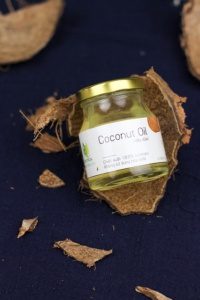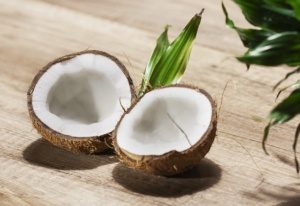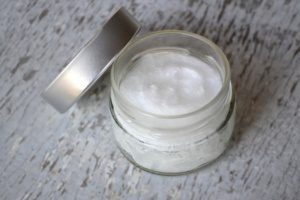How Healthy Is Coconut Oil?
Coconut oil is often touted as a healthier alternative to other fats, claiming various internal and external health benefits. Women’s magazines, books, and websites frequently promote coconut oil as a remedy for slimming down, reducing blood lipid levels, safeguarding heart health, and improving overall well-being. However, it begs the question: how much of these assertions are grounded in scientific evidence, and how much is simply the result of effective marketing?
Is Coconut Oil a ‘Healthy Fat’?
No, it is not. Coconut oil primarily comprises saturated fatty acids, which are neither essential nor beneficial for the body’s well-being. Saturated fatty acids, whether sourced from animals or plants, elevate the risk of cardiovascular disease. Contrary to advertising claims, coconut oil raises LDL cholesterol levels [3].
Some argue that coconut oil is uniquely high in certain fatty acids known as MCTs (Medium-Chain Triglycerides), which may not impact cholesterol levels. While it is true that approximately 50% of the fatty acids contained in coconut oil are classified as MCTs, one of them, lauric acid, behaves metabolically in the body much like ‘normal’ fatty acids. In practice, this contradicts the theory.
Healthy fats, by definition, are rich in unsaturated fatty acids. Coconut oil, with 90% saturated fatty acid content, falls far short of meeting this criterion. Healthy fats also boast significant omega-3 fatty acids, such as canola oil.
In summary, coconut oil is not a healthier option when compared to other vegetable oils. Quite the opposite is true.
Can Coconut Oil Aid in Weight Loss?
There is a widespread belief that lauric acid found in coconut oil can assist in weight loss by purportedly ‘activating’ fat burning and allowing for unlimited consumption without causing weight gain. However, it is crucial to recognize that coconut oil contains calories. If you consume more calories than you expend, you will gain weight, and this principle also applies to coconut oil. The concept of ‘negative calories’ is a myth.
The German Nutrition Society also provides a straightforward verdict regarding the medium-chain fatty acid (MCT) lauric acid, often hailed for its health benefits in coconut oil: “Medium-chain triglycerides are not recommended for obesity therapy. Scientific evidence supporting long-term weight management with MCTs is lacking” [2].
In summary, coconut oil does not possess weight loss properties. Whether coconut oil or other dietary fats, fats have the highest caloric density.
Is Coconut Oil a Suitable Choice for Frying and Deep-Frying?
When heating vegetable fats, the formation of harmful trans fatty acids occurs, which can also have implications for conditions like endometriosis. Therefore, it is essential to consider the heat stability of the oil you use for frying or baking.
Coconut oil is heat-stable and boasts a smoke point at around 185-200°C, making it suitable for frying. However, it is not ideal for high-temperature roasting or baking, where the food exceeds 200°C. For comparison, virgin olive oil should not be heated beyond 130°C. Interestingly, Germany’s commonly used frying fat, available in solid blocks, also contains a portion of coconut oil.
Nevertheless, avoiding using coconut oil for frying is advisable because healthier alternatives are available, such as refined rapeseed oil. Unlike coconut oil, rapeseed oil lacks unhealthy saturated fatty acids, offering healthy unsaturated fatty acids and a well-balanced ratio of omega-3 to omega-6 fatty acids. There are even specialized ‘frying oils in the market,’ which, while possibly derived from less healthy sunflower oil, still rank as healthier than coconut oil.
Is Coconut Oil Beneficial in Cosmetics?
Coconut oil has a long history of use in its countries of origin for skin and hair care, making it a sensible and healthy choice. It nourishes the skin and hair and even offers some mild protection against sunburn [1]. Additionally, it serves as a natural substitute for cosmetics containing mineral oil.
However, just as in the kitchen, there are equally effective domestic alternatives in cosmetics. Rapeseed oil, for instance, is much healthier than coconut oil, which has traveled a long way from tropical regions. There are also regional alternatives to coconut oil in cosmetics that offer similar nourishing properties, with sunflower oil being a noteworthy example. Perhaps you would prefer to repurpose any leftover, less healthy sunflower oil from your kitchen as a body lotion in the bathroom?
Conclusion:
Coconut oil does not hold a health advantage over other vegetable fats; it poses a health risk by increasing LDL cholesterol levels [3].
While cosmetics may not outperform domestic alternatives significantly, it is a safe choice for health and generally preferable to those containing mineral oil.
References
- Finding the Perfect Nutritionist: A Step-by-Step Guide - 5. October 2023
- Does Monk’s Pepper Help with Endometriosis? - 5. October 2023
- A Brief Overview of Dietary Fats - 29. September 2023




